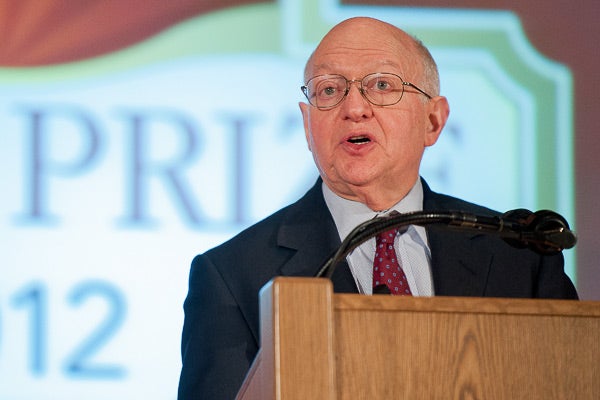|
December 5, 2012
Economist Martin Feldstein receives 2012 SIEPR Prize at Stanford, calls for a cap on taxpayer benefits
Accepting the SIEPR Prize for Contributions to Economic Policy, economist Martin Feldstein called for action on the budget deficit via a cap on tax reductions for individual taxpayers. By Max McClure

Martin Feldstein speaks before receiving the SIEPR Economic Prize for Contributions to Economic Policy. (Photo: Steve Castillo)
At a ceremony at Stanford's Arrillaga Alumni Center Monday, Harvard economics professor Martin Feldstein was presented with the 2012 SIEPR Prize for Contributions to Economic Policy.
In his remarks during the event, Feldstein took the opportunity to call for action on the budget deficit – a subject, he said, "that should worry everyone in this room."
Feldstein is the second winner of the $100,000 prize, awarded biannually by the Stanford Institute for Economic Policy Research (SIEPR).
Beyond his well-known academic research on macroeconomics and public finance, Feldstein served as the president and CEO of the National Bureau of Economics, has advised four U.S. presidents (including as Ronald Reagan's chief economic adviser) and served as a director at several Fortune 500 companies, including AIG, Eli Lilly and JP Morgan.
"You look at this list of things that he's done, it's impossible," said George Shultz, distinguished fellow at the Hoover Institution and former U.S. secretary of treasury, labor and state. "You read it, you're tired." Shultz was a member of the prize selection committee, along with John Shoven, the director of SIEPR; Jim Poterba, the president of the National Bureau of Economic Research; and Nobel prize-winning economists Kenneth Arrow and Gary Becker.
Before the award presentation, Feldstein pointed out that the deficit will still be more than 5 percent of GDP 10 years from now, even with a healthy economy – a debt ratio that, he said, would hurt economic growth, trade and business investment, while making the economy more vulnerable to future crises.
In the long term, Feldstein proposed slowing Social Security benefits growth so that 2037 levels are about 80 percent of what they would be under current law. He said he would do that by raising the age of eligibility, changing inflation indexing, or otherwise modifying Social Security outlays.
"The right programs for the affluent seniors now and in the future are not the same as the programs that were created in the 1930s and the 1960s," he said.
Even with these reductions in benefits, however, Feldstein argued that the value of benefits would continue to rise as incomes grow. Under his proposed slowdown of Social Security, assuming growth in individual earnings of around 1.7 percent a year, the economist said that real benefits would be 40 percent higher than they are today.
Growth in Medicare and other government health programs should also be slowed, he said.
To control the deficit in the short term, Feldstein advocated a tax reform approach, reducing special deductions and exclusions.
He suggested a cap on tax deductions equal to 2 percent of an individual's adjusted gross income, with an exception for charitable gifts. The plan would, he said, raise $145 billion in 2013.
Feldstein was not optimistic, however, that a deal would be reached before the country goes off the fiscal cliff – an event the Congressional Budget Office has predicted would spark a new recession. He viewed the political impasse between President Obama, who hopes to raise taxes on individuals with income above $200,000, and House Republicans, who want to preserve current tax rates, as potentially unsolvable.
"Voting to raise tax rates now after promising not to do so in the recent campaign could make [House Republicans] vulnerable to a challenge from the right," he said
Feldstein is, for his part, also opposed to raising taxes on the top 2 percent.
"Distributional fairness is in the eyes of the beholder," he said. "The line between a fair distribution of the tax burden and spiteful egalitarianism is unclear."
Initial funding for the prize came from George Shultz.
-30-
|